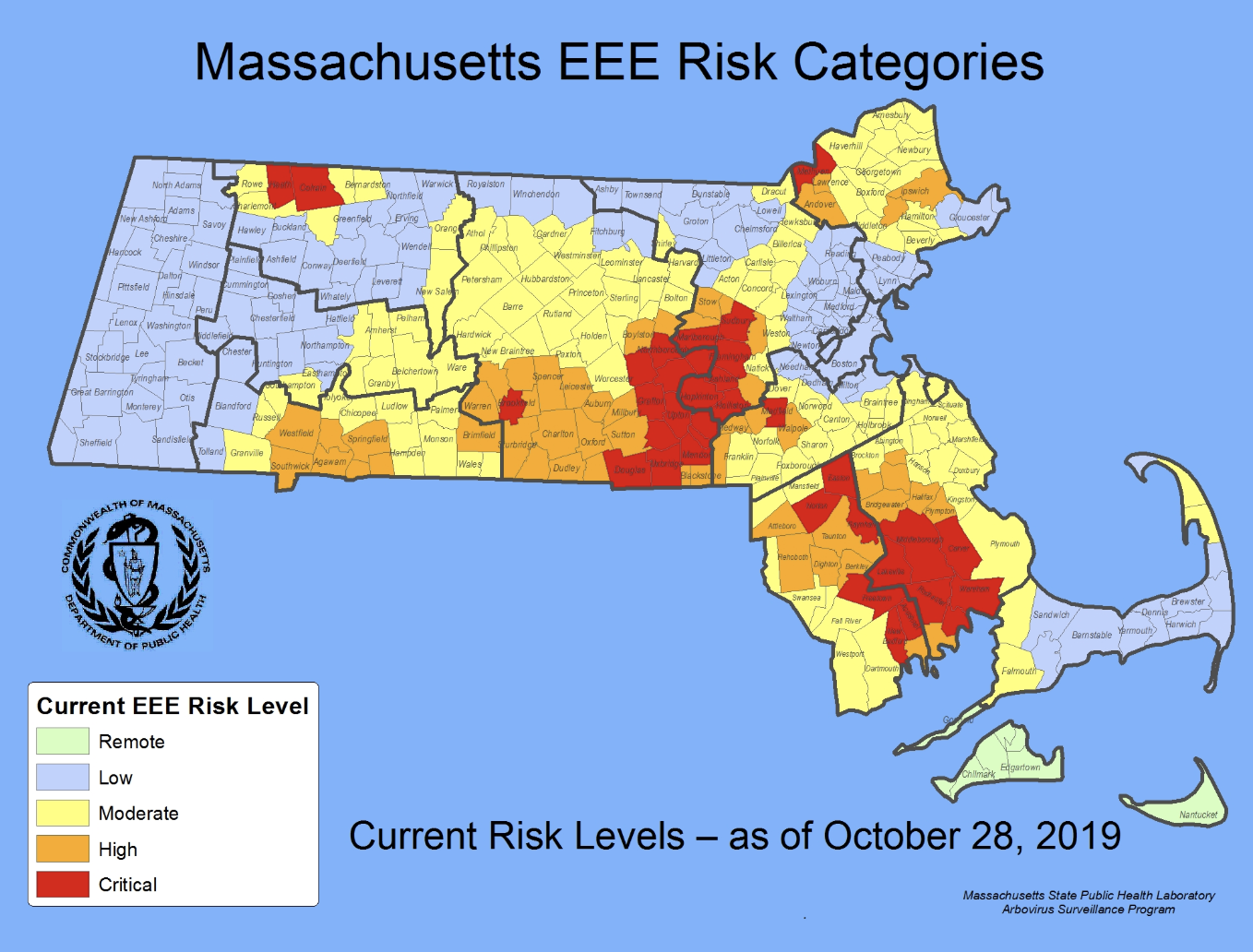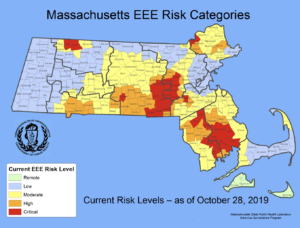
 An Update from the Health Department on Continued EEE Risk in Wayland
An Update from the Health Department on Continued EEE Risk in Wayland
Wayland will remain designated by the state as a “HIGH” risk for Eastern Equine Encephalitis (EEE) until after the first hard frost and it is important for people to continue to take personal precautions against mosquito bites. These steps include using EPA-approved bug spray, wearing long sleeves & pants outdoors to reduce exposed skin, and staying indoors and cancelling outdoor activities in the hours from dusk to dawn when mosquitoes are most active.
“We continue to emphasize the need for people to protect themselves from mosquito bites,” said Public Health Commissioner Monica Bharel, MD, MPH. “Although mosquito populations are declining, some risk will continue until the first hard frost.” October 11, 2019.
When temperatures between 27-29 degrees Fahrenheit have occurred over wide geographic areas, risk from mosquito-borne disease is considered to have ended inside that area. There have been several frosts so far this fall, but no hard frosts yet in Wayland or in many areas of the state (and not in the foreseeable future). Areas that have had temperatures between 29-33 degrees Fahrenheit may still have some remaining risk from mosquito-borne disease and communities should continue to exercise judgement in rescheduling outdoor, evening activities.
The peak time for transmission of mosquito-borne illness extends through September in Massachusetts although the risk remains until the first hard frost. The risk of EEE and other mosquito-borne illnesses is diminishing as we get deeper into fall but, we still have to be conscious of it. Mosquitoes are cold-blooded so they rely on a warm environment for heat, which means they become less active in the cold. People should be aware that the times of dusk and dawn will change on November 3rd when clocks are turned back by one hour and dusk/dawn times will continue to change as we approach the winter solstice.
Residents should be aware that there are still many communities in Massachusetts at high and critical risk for EEE. So if you travel outside of Wayland to an adjacent community, you should check the MDPH website for information on these towns and be aware of the risk of EEE. If a community is at high or critical risk you should consider staying indoors during the dusk to dawn hours to reduce exposure to mosquitoes. Back in September, the state conducted helicopter spraying in certain identified towns to control mosquito-borne illness for EEE and reduce mosquito populations, however this does not eliminate the risk of EEE transmission.
The Health Department website includes information on EEE, ways to protect against mosquitoes, risk levels in communities and updates from MDPH: https://www.wayland.ma.us/
Protecting yourself from mosquito bites and preventing mosquito breeding in your yard
Please check your yards for items that can collect water and harbor mosquito breeding. As outlined further below in this memo we have provided recommendations for avoiding mosquito bites (which can lead to mosquito-borne illness) and how to prevent your yard from becoming a mosquito breeding area.
What you should do to avoid mosquito bites
Residents should continue to take precautions to avoid mosquito bites.
Be aware of peak mosquito hours:
- The hours from dusk to dawn are peak biting times for many mosquitoes. Mosquitoes are more active in damp, shady areas, during cloudy humid days, and at night. Reschedule outdoor activities that occur during evening or early morning and take extra care to use repellent and protective clothing during peak mosquito hours.
- Be aware that there are some emerging mosquito species that are out and active during the day. Be sure to protect yourself and family members during the day also.
Wear protective clothing:
- Clothing can help reduce mosquito bites. Although it may be difficult to do when it’s hot, wearing long-sleeves, long pants and socks when outdoors will help keep mosquitoes away from your skin.
- Cover up the arms and legs of children playing outdoors. Baby carriages and playpens should be covered with mosquito netting.
Apply insect repellent when you go outdoors.
- Use a repellent with DEET (N, N-diethyl-m-toluamide), permethrin, picaridin (KBR 3023), IR3535 (3-[N-butyl-N-acetyl]-
aminopropionic acid) or oil of lemon eucalyptus [p-menthane 3, 8-diol (PMD)]. - DEET products should not be used on infants under two months of age and should be used in concentration of 30% or less on older children.
- The Center for Disease Control has recently listed Oil of lemon eucalyptus as providing protection against mosquitoes; however, it should not be used on children under three years of age.
- Permethrin products are intended for use on items such as clothing, shoes, bed nets and camping gear and should not be applied to the skin.
- Protect pets and horses from mosquito bites.
- Always follow the instructions on the label of any repellent. More information on choosing and using repellents safely is listed below.
For further information on WNV or EEE, log unto the Massachusetts Department of Public Health web site at:
https://www.mass.gov/mosquito-
If residents have any questions about mosquitoes or how to control them: the East Middlesex Mosquito Control Project can be reached at:
Choosing and using repellents safely:
https://www.epa.gov/insect-
http://www.cdc.gov/westnile/
The National Pesticide Information Center (NPIC) toll free at 1-800-858-7378 or online at http://npic.orst.edu/index.
www.mass.gov/
Julia Junghanns, R.S., C.H.O.
Director of Public Health










